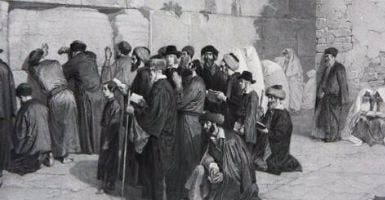It is fairly common for elderly people to say Kadish in Shul, even if they are not cognitively intact, such as individuals with dementia or Alzheimer’s disease. Is it permissible to answer Amen to their Kadish?
A further question: What should one do if he hears a person with Alzheimer’s disease recite a Birchas haNehenin? If the patient sometimes forgets to eat after finishing his Bracha, should he answer Amen, or should he be concerned that it will be a Bracha l’Vatala again?
The Shulchan Aruch rules (O.C. 215) that upon hearing a Jewish person recite a Bracha, one should answer Amen. However, if the Bracha was recited by a heretic, or a Kusi (a non-Jew) or a Tinok, one should not answer Amen. The Shulchan Aruch (ibid. 3) clarifies what is meant by a Tinok:
That which we do not answer Amen following [the Bracha of] a Tinok is specifically when he learns with his teacher (i.e., he is reciting a Bracha l’Vatala – a Bracha without purpose, which is permissible under the circumstances in order to educate the child). But when they say Brachos to exempt themselves (i.e., Brachos on food or during Tefila), since they are subject to Chinuch (training in Mitzvah observance), we do answer ‘Amen’. And likewise when they recite the Haftara in Shul.
The source of this Halacha is the Gemara in Brachos (53b) and the accompanying words of Rashi and the Rosh. The Mishna Berura (ibid. 16) quotes the Pri Megadim who comments: “This implies that one should not answer Amen to a Bracha before eating and so forth [recited] by a [child who is] younger than [the age of] Chinuch“. In other words, the fact that the Shulchan Aruch invokes Chinuch in qualifying when one does answer Amen to the Bracha of a child implies that one may not answer Amen to the Bracha of a child before he reaches the age of Chinuch, even if he is making a Bracha over food and not simply learning how to recite Brachos.
The practical application of this Halachic opinion is complex and difficult, given that the age of Chinuch is not fixed and it varies from Mitzva to Mitzva according to the child’s understanding and ability to properly fulfill each Mitzvah.[1] However, this does not necessarily mean that there is no minimum age below which it cannot be considered the age of Chinuch. Rav Ovadia Yosef zt”l (Yabia Omer 2:13) cites a Teshuva of the Rivash (551) regarding including a child in a Minyan. The Rivash maintains that even those who hold that a child can make up a Minyan agree this does not apply below the age of six – even if he is intelligent and knows to whom we recite Brachos and Daven. This is because he has not yet reached “Onas haPe’utos” – the age at which his financial transactions have legal validity by Rabbinic institution. He has the status of someone without Da’as – one incapable of reason.
In light of the Rivash’s ruling (which is also implied by the Beis Yosef 199), the Yabia Omer concludes that under no circumstances should one answer Amen to the Bracha of a child below the age of six. However, above the age of six, one should answer Amen to his Brachos if he knows to whom we recite Brachos. (When in doubt as to the level of his understanding, one should wait until his ninth birthday, after which we can assume that he has the requisite understanding).
However, in a later Teshuva (8:25), the Yabia Omer retracts his original ruling and writes that even if he is not yet six, one should answer Amen as long as he is at least five years old and knows to whom he is reciting his Brachos,
In practice, the prevailing custom is not like the Yabia Omer; we answer Amen to the Brachos of children well below the age of Chinuch, with some permitting it even in the case of a three-year-old. The Poskim contend that as long as the child has become accustomed to reciting Brachos and knows to whom we recite them, he is considered to have reached the age of Chinuch for the Mitzva of Brachos even though he may not understand the particular meaning of each Bracha. [This is Rav Yosef Chaim Sonnenfeld zt”l’s interpretation of the prevalent custom (Salmas Chaim, O.C., 50). This is also implied by R’ Ben Zion Abba Shaul zt”l (Or l’Ttzion 2, p134).][2]
Seemingly, at the crux of this Halachic debate is not so much whether the child is obligated to recite the Bracha (which would mean that the criteria for answering Amen is whether the Bracha was Halachically required), but rather whether the child’s recitation can be classified as a Bracha. This depends on whether the child has become accustomed to reciting these words and whether he understands to whom they are directed. If he understands this, it would be considered a Bracha. Otherwise, it is not. If so, it is possible to adopt the position of Rav Yosef Chaim Sonnenfeld without having to argue that there is no lower limit for the age of Chinuch. Perhaps a young child has not yet reached the age of Chinuch, but one may nonetheless answer Amen to his Brachos as they are still classified as a Bracha. As long as he understands to whom he is directing his Bracha, it is a Bracha and one answers Amen to a Bracha, even when the one who recited it was not Halachically required to do so.
This is also implied by the Mishna Berura (215:13) when explaining why one should not answer Amen to a Bracha recited by a child below the age of Chinuch or by a child above the age of Chinuch for solely educational purposes: “For it is not appropriate to say Amen to endorse and certify the words of the one reciting the Bracha, since this is not a Bracha”.
Accordingly, one would also not answer Amen to the Bracha of a child who has reached the age of Chinuch but has no idea of its meaning or purpose whatsoever (such as one who grew up in a home which did not provide him with an adequate Torah education). These concepts are similarly applicable to the Brachos of a Shoteh – an insane person, as the Mishna Berura (124:47) rules:
One should not answer ‘Amen’ to [the Brachos of] a Shoteh, for he is not subject to Mitzvos whatsoever.
In other words, the Halacha of responding to the Bracha of a Shoteh is based on the same principles that we just reviewed regarding a young child. If a Bracha does not have the status of a Bracha, one should not answer Amen. Therefore, if it is clear that the Shoteh does understand the meaning of the words of his Bracha, and he knows to whom Brachos are directed, it is considered a Bracha and one could answer ‘Amen’, despite the fact that the person reciting it is exempt from reciting Brachos.
If so, in the case of a person with Alzheimer’s disease, even if he is Halachically considered to be a Shoteh, it is often the case that he meets the criteria for reciting a valid Bracha: He is accustomed to reciting Brachos, he recognizes his Creator, and he directs his Brachos towards Him. His Brachos are therefore Brachos and one should answer Amen.
Regardless of the debate whether or not one should recite Amen, the Chashukei Chemed (Brachos 3a) asserts that one may certainly answer “Yehei Sh’mei Raba”. This is because the responses Amen and Yehei Sh’mei Raba are fundamentally different. Whereas Amen is a certification and validation of what was previously said and is therefore only appropriate when the Bracha has the status of a Bracha, Yehei Shemei Raba is an independent statement of praise to Hashem.[3]
However, there is an additional consideration that may impact whether Amen should be answered to Kadish recited by a person with Alzheimer’s disease, namely a “Guf Naki” – the requirement to be clean of human waste when reciting Devarim she’b’Kedusha. With regard to Brachosrecited by children, the custom is to rely on the Divrei Chaim (2:9) who rules that even if a child has not properly cleaned himself after defecation, it does not pose a Halachic issue to those around him (as it is covered and not offensive) or to the child himself (he is not obligated to have a Guf Naki). Therefore, one may answer Amen to his Brachos. Although many dispute the Divrei Chaim’s ruling, arguing that one should not answer Amen to a Bracha which should ideally not have been recited, the custom is to rely on this ruling as part of the process of training children to say Brachos. However, since this reasoning does not apply to an elderly patient, one may not answer Amen to his Brachos if there is reasonable concern that he does not have a Guf Naki.
Our second question was whether a person should answer Amen upon hearing a person with Alzheimer’s disease recite a Birchas haNehenin if he forgets to eat after reciting a Bracha (or, even if he is reminded to do so, he may still not eat, or will eat but only after reciting another Bracha). This question takes for granted that if a person recites a Birchas haNehenin and fails to eat or drink, his Bracha is a Bracha l’Vatala and one should certainly not answer Amen to it. This assumption is in line with the Shulchan Aruch’s ruling (215:4) that, “Anyone who makes an unnecessary Bracha and mentions the Divine name in vain, is [considered] as though he has taken a false oath, and it is forbidden to answer Amen to his Bracha”. The Mishna Berura (ibid. 18) adds that this is even true when a person does eventually eat, but there is a significant time lapse (Hefsek)between the Bracha and eating.
It is incorrect to suggest that it is only forbidden to answer Amen when a Bracha is intentionally recited in vain. As stated above, it is even forbidden to answer Amen to Brachos recited by young children while being taught to say them correctly; clearly, the rule that one should not answer Amen to a Bracha l’Vatala has nothing to do with malicious or improper intent. If we do not respond Amen to children who are permitted to recite Brachos, the same should to be true when an Alzheimer’s patient inadvertently recites a Bracha in vain (see the Mishna Berura ibid. 21).
One could argue that the case of an Alzheimer’s patient is different because he may remember to eat after his Bracha. If so, perhaps his Bracha is a valid Bracha. However, this argument may be refuted by the principle “Safek Amen l’Kula” (when in doubt, do not recite Amen). This principle is cited by the Bi’ur Halacha (ibid.) when discussing whether one should answer Amen to a Bracha which is only valid according to a minority (but reasonable) view in the Poskim (such as to the Bracha of Borei Nefashos concluded with the words, “Baruch Ata Hashem Chei haOlamim” as per the view of the Talmud Yerushalmi). He concludes that although one is not obligated to answer Amen due to the principle of “Safek Amen l’Kula”, one is permitted to do so, as the Pri Chadash rules that it does not constitute “Lo Sisa – proclaiming the name of Hashem in vain”.
The Pri Chadash’s reasoning appears to be that as long as a Bracha has a fair basis – it is legitimate according to a reasonable view in the Poskim – it cannot be deemed a proclamation of Hashem’s name in vain. In our case, by contrast, the Bracha is potentially proclaimed in vain. If the Alzheimer’s patient does not eat, although no harm was intended and it is not considered sinful on his part, his Bracha was nonetheless meaningless – a non-Bracha (and the Divine Name was proclaimed in vain). Therefore, we revert to the principle of Safek Amen l’Kula. Not only is one exempt from answering ‘Amen’, but it may also even be prohibited.
[1] [Editor’s note: See Sukka 42a]
[2] Others have taken the view that the reason we answer Amen to the Brachos of a three-year-old has nothing to do with the Bracha itself. Indeed, one should not answer Amen to a Bracha recited by someone below the age of Chinuch. Rather, the purpose of the Amen is the Amen itself, in other words, to train the child to answer Amen. If we answer Amen to his Brachos, he will say Amen to the Brachos of others. For this reason, HaGaon Rav Shlomo Zalman Auerbach zt”l would mumble his Amen and omit the final letter Nun, so that he did not actually answer Amen but would still educate the child to answer Amen, since the child could not detect the difference. For the same reason, HaGaon R’ Ben Tzion Abba Shaul zt”l recommended that one answer “Baruch Hashem l’Olam Amen v’Amen – Blessed be Hashem forever Amen and Amen” to a young child’s blessings, reciting all the words other than the word Amen, silently.
[3] See the Mishna Berura, 56:2, who rules that for this reason one should pause between Amen and Yehei Sh’mei Raba. The Amen refers back to the preceding statement, whereas Yehei Sh’mei Raba is a new and independent statement.














